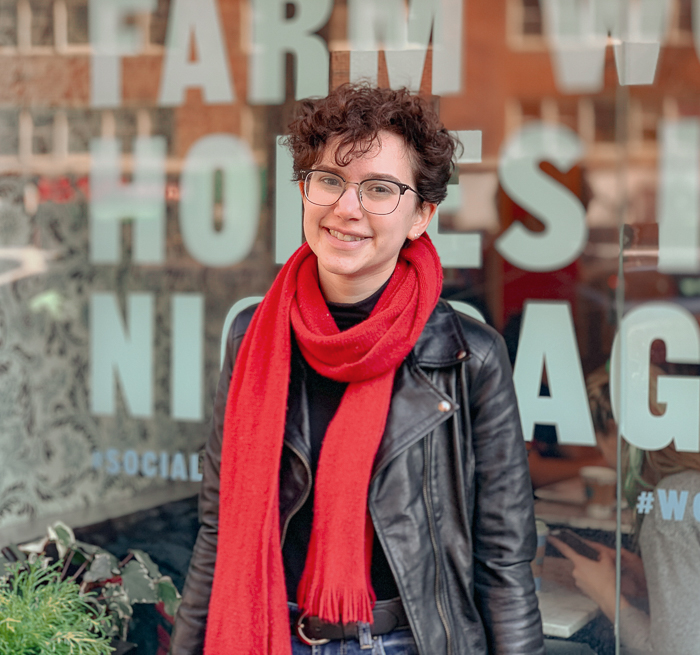
During the spring semester of 2019, Gallatin senior Katie Peurrung received a rather chilling message from her ex-roommate. It was a screenshot of a Google search regarding Peurrung’s egg allergy that said air exposure generally doesn’t cause anaphylaxis, a potentially life-threatening allergic reaction. Underneath that screenshot was another message that said, “This should clear things up.”
Peurrung had no idea how to respond.
“That was the point where I was like, ‘I’m done,’” Peurrung said.
Despite her previous efforts to explain her egg allergy — it’s airborne so exposure can affect the severity of her reaction which, in Peurrung’s case, got worse — it seemed that her roommate didn’t take that information into consideration.
“If you’re gonna try to WebMD me out of my own health issues which I’ve had my entire life, [then] I don’t know how to talk to you anymore,” Peurrung said. “So I moved out.”
Moving out of her room on the 17th floor of Gramercy Green Residential Hall mid-semester might seem like a dramatic decision to make, especially considering other responsibilities that come with being a student, but Peurrung felt that she had no other choice. Her health and safety will always come first — if not taken care of, her allergies can put her life in harm’s way.
After scrambling to find another place to move into, with the help of a counselor at the Student Health Center, Peurrung submitted paperwork to the Moses Center for Students with Disabilities to get approval to move out. For the latter part of the spring semester, she lived on the 4th floor of Gramercy with a friend.
Housing at NYU can be tricky for students with food allergies; it can feel like a burden to place food restrictions on a stranger, but can also lead to severe allergic reactions if not properly discussed with roommates and/or suitemates.
Food allergies can be regarded as a disability — one that isn’t visible but is still very much real. While health issues differ for students and are important to take into consideration when moving in with someone new, students with food allergies face the obstacle of going the extra mile to prevent any allergens from infiltrating their living space. Communicating that to a new roommate may be difficult: it’s hard to ask somebody to adjust their way of living. Such requests may lead to either a respectful relationship or, in cases like Peurrung’s, an unexpectedly hostile reaction and consequential bullying. Furthermore, not regarding allergies as a real disability can affect students when trying to find accommodations to help them live safe and healthy lives.
Tisch senior Lani Kording had an experience similar to Peurrung. Kording’s tree nut allergy — walnuts, cashews, almonds, etc. — is so dangerous that the mere exposure to a walnut particle puts her at risk of anaphylactic shock. Therefore, she takes extra steps in her daily life to be mindful of the risks: she reads food packaging labels, stores her dishes in a safe place so they can’t be used by others and purchased her own mini-refrigerator when she lived on campus.

However, during her sophomore year while living at University Hall, Kording was put into a difficult situation due to her suitemates’ cooking preferences. While they wouldn’t bring a bag of cashews into their suite, they would frequently cook with nuts — especially walnuts — and would even use Kording’s dishes, which made them unsuitable for her to use. At one point, Kording couldn’t leave her room because her suitemates were cooking walnut shrimp and the mere smell made her nauseous.
“I definitely felt unsafe, especially because I told them before, and because I felt embarrassed talking about it,” Kording said. “It’s like a weird sense of embarrassment, but also I need to stand up for myself because no one else will.”
For Kording, discussing her tree nut allergy brings up feelings of shame — she worries that people perceive her as the “nut allergy girl that’s probably being paranoid or overreacting,” when she’s not. But one way Kording has been able to overcome this insecurity is by thinking about how she perceives others’ physical and non-physical abilities.
For example, she has become more understanding of people who take the elevator to the second floor instead of taking the stairs because she doesn’t know their personal struggles, or if they have a disability. Similarly, she hopes that others are able to think past their own perceptions regarding food and become more aware of other reasons why she avoids eating tree nuts.
“I wonder if people think the same about me when I don’t eat at certain restaurants just because I get an unsafe feeling about it,” Kording said. “I’m sure people see me and think ‘She’s just picky.’ But that’s not the case, and they don’t know my life. They don’t know me. [My allergies] are not visible but [they’re] still there.”
After emailing back and forth with the Moses Center during the housing selection process during her sophomore year, at the very last minute, Kording was placed in a single room in Alumni Hall for her junior year, but wasn’t guaranteed that her suitemate wouldn’t eat nuts. For Kording, this was a form of recognition of her food allergy.
Similarly, CAS and Steinhardt junior Sarah Patt was able to get accommodations through the Moses Center for their allergies. While they weren’t given a clear explanation why, they were placed in Founders Hall their first year. They were less worried about their housing situation because the dorms in Founders Hall don’t have kitchens, which left little room for their roommates to be uncooperative.

Another reason Patt wasn’t worried was because, coincidentally, one of their suitemates from their first year has a sister with severe food allergies, which made Patt feel more comfortable in their living space as they didn’t feel the burden of having to educate their roommate about their situation. Luckily for Patt, they haven’t had any uncooperative roommates and haven’t needed to reach out to the Moses Center about their food allergies since their first year.
“I think I’m technically supposed to [contact them], but I honestly don’t really want to because I’ve gotten to a point in my life where I’ve been dealing with this for forever,” Patt said. “So I know how to manage myself.”
Peurrung, on the other hand, wasn’t too successful with the Moses Center. While she was granted housing accommodations during the fall of 2019 for her insomnia and anxiety, she was told that because her sensitive allergic reaction was rare, the Moses Center wouldn’t be able to accommodate her allergies. In fact, the Moses Center told Peurrung that to determine whether she could get accommodations for her allergies, she would have to get allergy testing done. But that meant Peurrung would have to travel to her allergist’s office in the Upper West Side and redo her allergy testing just to prove that her health issues were real.
“I just wished they would have believed me,” Peurrung said.
While Peurrung has never considered her allergies to be a disability, it is frustrating for her when people don’t believe her health condition is real, especially because she knows how intense it can be to deal with her allergic reactions.
It’s important for students without allergies to be considerate by engaging in conversations about non-physical disabilities and believe those who say they have specific health issues.
“At the end of the day, no one understands your allergy as much as you do,” Kording said. “So my advice is to make your voice heard.”
The Moses Center declined to comment for this story.
Disclaimer: Katie Peurrung was a Multimedia Editor in fall 2018 and UTA Multimedia Editor in spring 2019.
Email Mandie Montes at [email protected]. A version of this article appeared in the Thursday, Feb. 20 print edition. Read more from Washington Square News’ “Housing Guide 2020.”

























































































































































